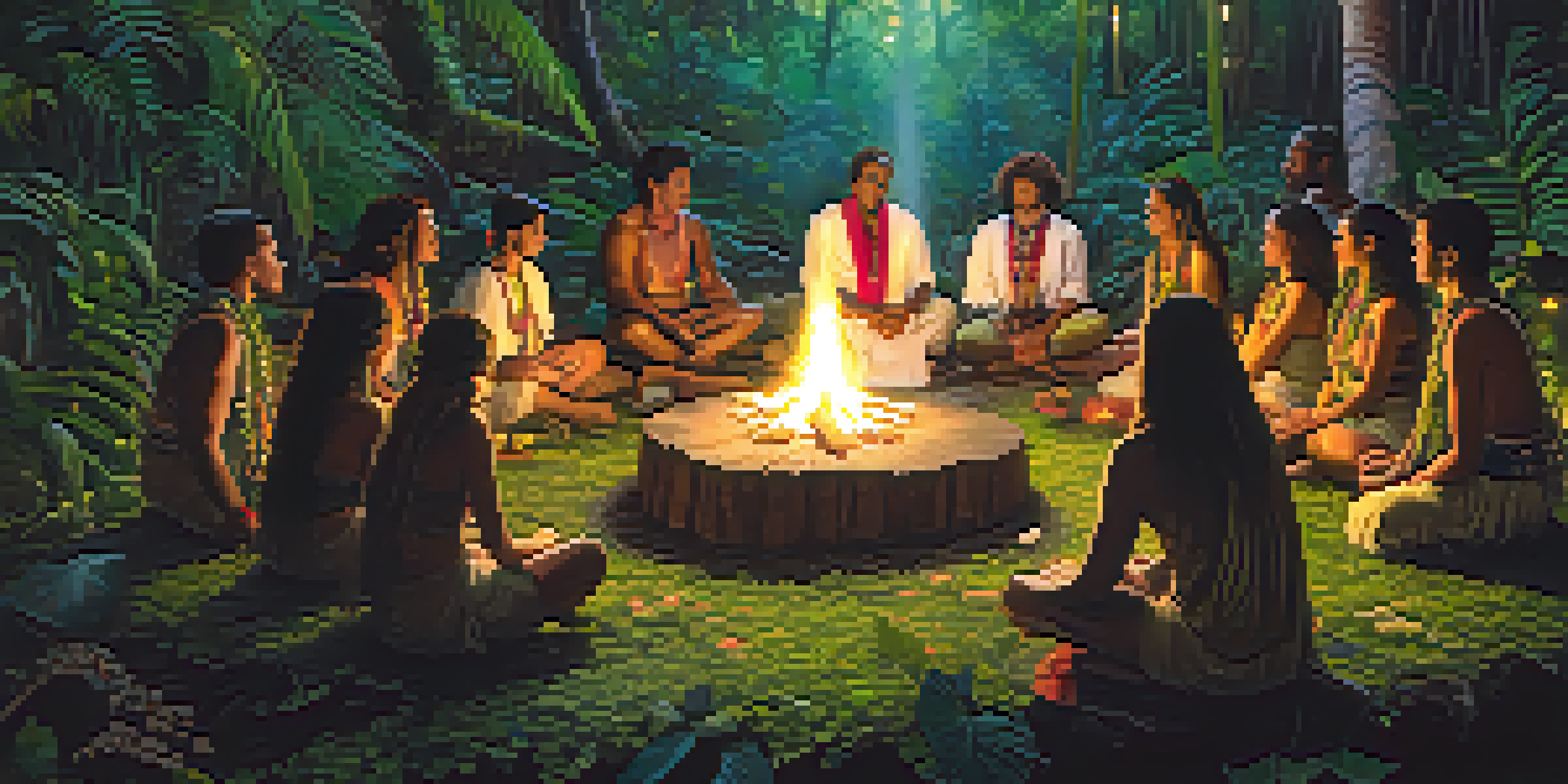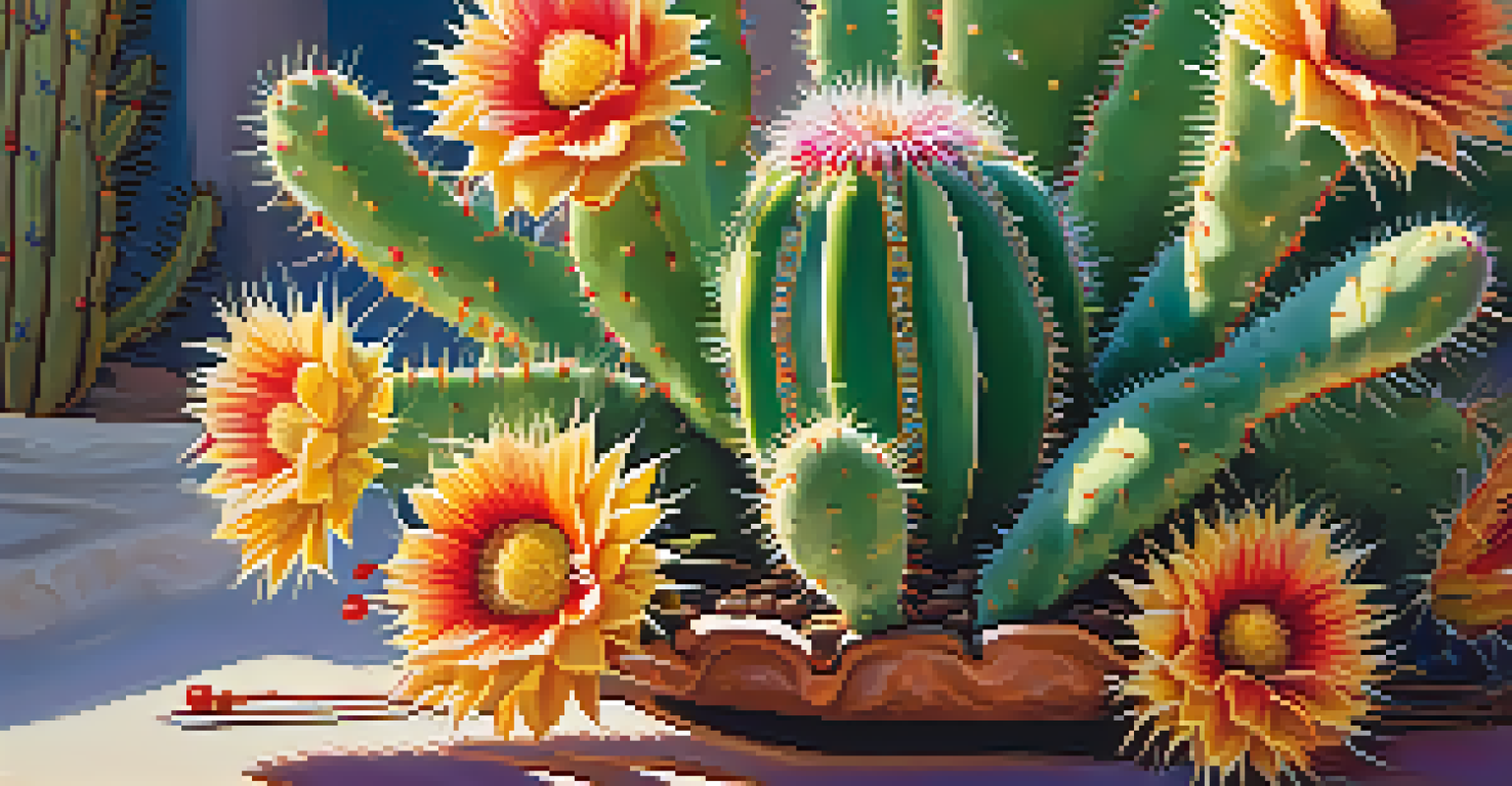Cultural Significance of Psychedelics in Indigenous Practices

Understanding Psychedelics: A Brief Overview
Psychedelics are substances that alter perception, mood, and cognitive processes. Common examples include psilocybin mushrooms, ayahuasca, and peyote. These substances have been used for centuries, not just for recreation but primarily in spiritual and healing practices within various cultures.
Psychedelics are not just a tool for recreation, but a means to connect with deeper truths about ourselves and the universe.
In indigenous contexts, these substances are often seen as sacred tools that facilitate deeper connections with the spiritual realm. They provide insights, promote healing, and foster community bonding through shared experiences. This cultural foundation sets the stage for understanding their significance.
While contemporary use of psychedelics is gaining interest in Western societies for therapeutic applications, it's essential to recognize that indigenous peoples have long revered these plants. Their practices are rooted in a rich tapestry of history and spirituality, which is often overlooked.
Historical Context of Psychedelic Use
Indigenous cultures around the world have integrated psychedelics into their traditions for millennia. For instance, the use of peyote by Native American tribes symbolizes a profound spiritual journey and has been part of their rituals for centuries. These practices are not just about the substances; they are embedded in a larger cultural narrative.

Historically, many indigenous groups have used psychedelics in shamanic rituals to communicate with ancestors or seek guidance from spirits. This connection to the past emphasizes the importance of these substances in maintaining cultural identity and continuity. It’s a way of honoring their ancestors and heritage.
Psychedelics as Sacred Tools
Indigenous cultures regard psychedelics as sacred substances that foster spiritual connections and communal healing.
Today, as globalization spreads, there is a renewed interest in these ancient practices. Unfortunately, this often leads to cultural appropriation, where the significance of these substances is diluted or misunderstood in modern contexts. Recognizing their historical importance is vital for respectful engagement.
Psychedelics in Healing and Spirituality
Many indigenous cultures view psychedelics as tools for healing, both physically and spiritually. For example, ayahuasca ceremonies in the Amazon are renowned for their therapeutic potential, allowing participants to confront traumas and emotional blockages. This healing process is typically guided by a shaman, ensuring safety and cultural integrity.
The greatest gift of the psychedelic experience is the ability to connect with the world around us and understand our place within it.
The spiritual aspect of psychedelic use is equally significant. Many believe that these substances can facilitate direct contact with divine entities, leading to transformative experiences. Participants often report feelings of unity with nature and a profound understanding of existence, which can lead to lasting personal change.
This intertwining of healing and spirituality showcases a holistic approach to well-being that contrasts sharply with the often fragmented views of health in Western medicine. Understanding this connection helps to appreciate the depth of indigenous practices and their relevance in today’s world.
The Role of Rituals in Indigenous Practices
Rituals play a crucial role in the use of psychedelics among indigenous peoples. These ceremonies are carefully structured, involving songs, prayers, and specific intentions that set the tone for the experience. This framework creates a safe space for participants to explore their inner worlds.
For example, in many Native American cultures, the peyote ceremony is a communal event that fosters connection and support among participants. Rituals not only enhance the experience but also reinforce cultural values and teachings passed down through generations. They serve as a reminder of the communal nature of healing.
Importance of Rituals in Healing
Rituals surrounding psychedelic use in indigenous practices create a supportive environment for profound personal transformation.
In contrast, recreational use of psychedelics often lacks this sense of ritual and community, which can lead to fragmented experiences. By understanding the importance of rituals in indigenous contexts, we can appreciate how they enrich the psychedelic experience and contribute to a sense of belonging.
Modern Research and Indigenous Wisdom
Recent years have seen a surge in scientific research exploring the therapeutic benefits of psychedelics. This renaissance in interest has led to a dialogue between modern science and traditional indigenous practices. Many researchers are now looking to indigenous wisdom for insights into the safe, respectful use of these substances.
For instance, studies have shown that the guided use of psychedelics can lead to significant mental health improvements, echoing the experiences shared in indigenous healing practices. This convergence of knowledge highlights the importance of respecting traditional methodologies while exploring new avenues for healing.
However, collaboration must be approached with caution. Indigenous knowledge is often seen as intellectual property that deserves protection and respect. Ensuring that indigenous communities benefit from research and are involved in discussions about their cultural practices is essential for ethical progress.
Cultural Appropriation vs. Cultural Appreciation
As interest in psychedelics grows, so does the risk of cultural appropriation. This phenomenon occurs when elements of a culture are adopted without understanding or respecting their significance. For instance, using sacred plants like peyote in a casual setting can trivialize their importance to indigenous communities.
Cultural appreciation, on the other hand, involves a respectful acknowledgment of the traditions and practices of others. This means engaging with indigenous cultures in a way that honors their history and significance. It’s about learning from these practices rather than exploiting them for personal gain.
Respecting Indigenous Knowledge
Modern research into psychedelics must honor and protect indigenous wisdom, ensuring communities benefit from their cultural practices.
Navigating this delicate balance is essential for fostering respectful relationships between indigenous communities and those interested in their practices. It encourages a shared understanding that promotes mutual respect and collaboration, rather than appropriation.
Looking Ahead: The Future of Psychedelics in Culture
The future of psychedelics in cultural practices is an evolving narrative that brings both hope and challenges. As more people recognize their potential for healing, there is an opportunity to elevate indigenous voices and wisdom in discussions about psychedelics. This could lead to a more integrated approach to mental health and spirituality.
However, it’s crucial that this movement doesn’t overshadow the voices of indigenous peoples. They must be at the forefront of conversations about their cultural practices and the use of psychedelics. Ensuring that they retain agency over their traditions is vital for preserving cultural integrity.

Ultimately, the resurgence of interest in psychedelics offers a chance to bridge gaps between modern and traditional practices. By fostering dialogue and collaboration, we can create a future where both indigenous wisdom and contemporary understanding coexist harmoniously, enriching our collective experience.